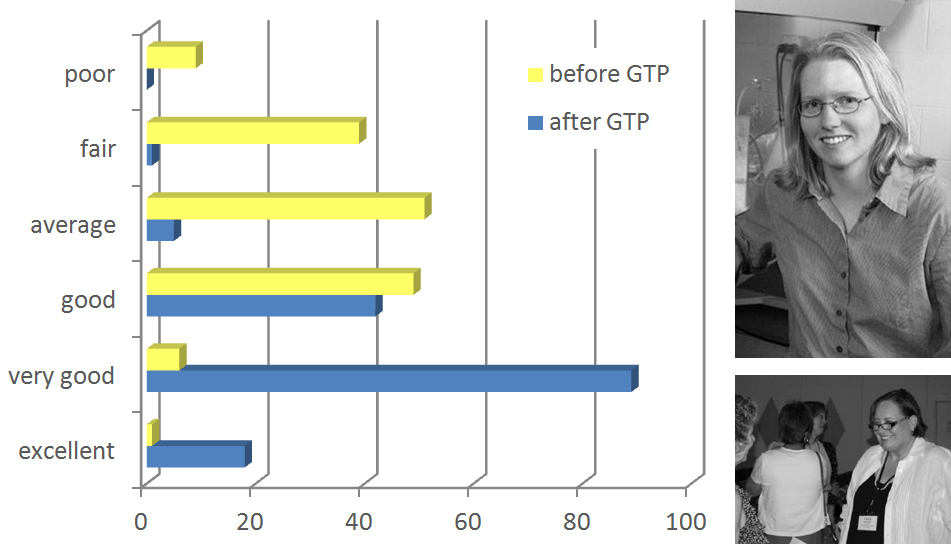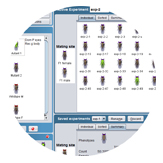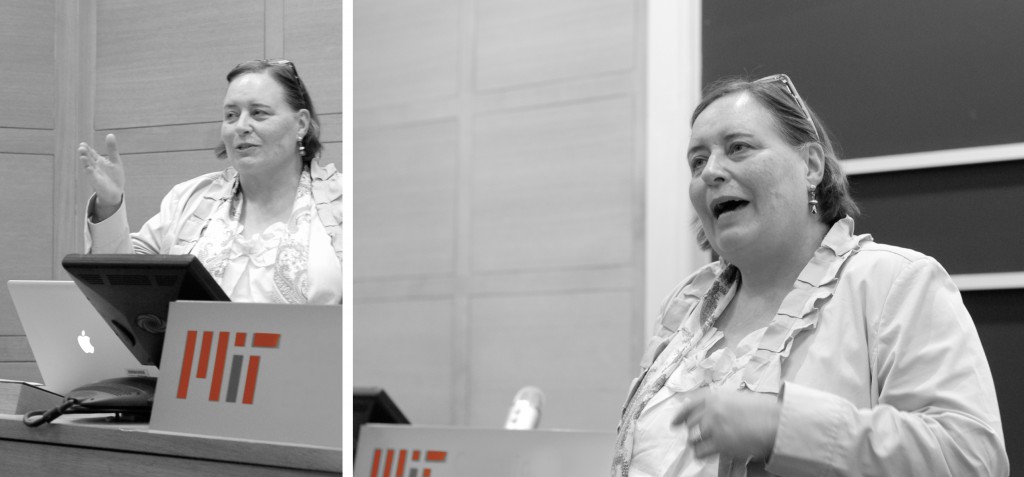Back to Seminar Archive List
 Dr. Laura Border
Dr. Laura Border
Seminar Topic: Teaching is an Intellectual Act: Sharing Faculty Expertise & Research with Graduate Students
Seminar Date & Time: Wednesday, May 25, 2011 @ 2:30 pm
Location: MIT 66-110
Hosted by: The Education Group
View the slides from Dr. Border’s Seminar.
Dr. Laura Border is the Director of the University of Colorado-Boulder’s Graduate Teacher Program (GTP), a truly model program that supports the professional development of graduate students, postdoctoral fellows, and faculty interested in improving their teaching skills. The GTP offers several training program tracks, including the Preparing Future Faculty program for graduate students and postdocs who plan to pursue an academic career at a postsecondary institution. Certification in the GTP’s programs is earned by completing challenging sets of requirements, which include new course development, evaluation by faculty from the trainee’s academic home department, participation in workshops across a range of educational topics and disciplines, and teaching portfolio preparation. Another of GTP’s initiatives is the Lead Network, consisting of graduate students (leads) who are selected by their home department faculty and trained to support other graduate students who teach recitations, labs, or first-year classes in their home departments. The Lead Network has been cited as a “Best Practice” in the Woodrow Wilson Foundation’s study of graduate education in the United States, The Responsive PhD: Innovations in U.S. Doctoral Education, and has won the TIAA-CREF Theodore M. Hesburgh Award for Exceptional Faculty Development Programs. The GTP also manages the Best Should Teach Initiative, which acknowledges excellence in teaching and academic leadership.
In her seminar at MIT, Dr. Border began by emphasizing the philosophy of the GTP: Teaching is an intellectual act. She reminded her audience that all scientific researchers do teach – not just in formal classroom settings, but also through their mentoring, in their research teams, and when communicating about their research to others.
Research universities are responsible for providing excellent graduate education, and preparing graduate students to teach is an essential aspect of graduate education, Dr. Border remarked. She described the importance of involving university faculty in training students and postdocs about teaching. “Professors represent a treasure trove of knowledge, expertise, skills, and research” that is put to good use at the University of Colorado because faculty across departments actively participate as teaching consultants and mentors in GTP training activities.
Dr. Border discussed the key goals of the GTP. First, the program aims to prepare graduate students for their teaching roles on the Boulder campus and as future faculty in postsecondary institutions. Dr. Border emphasized the importance of providing training that goes beyond minimal training typically offered to graduate student teaching assistants (T.A.s). “Nobody gets a job as a T.A.” she reminded. “You get a job as a faculty member.” Another goal of the GTP is to bring scholars from across campus to share their experience and research on college teaching, an especially valuable undertaking at the University of Colorado which is a rich environment for education-related research and innovation. The GTP also aims to showcase examples of outstanding teaching by the university’s research faculty and to apply findings from research on teaching to improve classroom performance and student learning.
The successful formation of the GTP, led by Dr. Border in 1985, was a collaborative effort involving the University of Colorado’s Dean of the Graduate School, the Vice Chancellor of Student Services, the Dean of the College of Education, the University Learning Center, and the Graduate Student Government. All of these groups rallied together in recognition of a need for better teaching training for the university’s graduate students. With this support behind her, Dr. Border created the framework for the GTP, which includes training in college pedagogy, personal professional development, assessment and evaluation, and timely topics determined as new issues arise. The creation of this framework was informed by a campus-wide needs assessment survey that she administered to department chairs, faculty, and graduate students. In 1988, the Graduate Teacher Certificate (now called the Certificate in College Teaching) program was launched. The award-winning Lead Network was funded in 1992, and the Preparing Future Faculty Program was underway by 2002.
The centralized GTP program works with ~1200 University of Colorado graduate students each year. Close to 12,000 individual students have participated in the program since 1992. About 400 students have completed the rigorous certification program. Exit surveys administered to students who have become certified show that students’ confidence in their teaching skills improves dramatically through the course of the program. Dr. Border reported that the GTP training also seems to benefit students when they negotiate faculty positions and starting salaries.
Dr. Border showcased HHMI Investigator Professor Kristi Anseth, formerly a graduate student participant in the GTP’s Lead Network and now a faculty member in UC-Boulder’s Department of Chemical & Biological Engineering. “The Graduate Teacher Program was one of those singular experiences that made a huge impact in my future career in academics,” says Professor Anseth. “My department prepared me to be an expert researcher and how to discover new knowledge. The GTP prepared me to be an excellent teacher of this knowledge.”
Please visit the GTP website to learn more about Dr. Border’s work and the many university-level teaching and professional development opportunities offered at the University of Colorado-Boulder. Also of interest are Dr. Border’s two inventories for best practice in graduate student development, published in the Journal on Excellence in College Teaching.

Left: Results from an exit survey administered to 155 students who participated in the GTP's "Certificate in College Teaching" program. Students were asked to rate their teaching skills before and after completing the program. Upper Right: HHMI Investigator Professor Kristi Anseth, who participated in the GTP's Lead Network during her graduate studies at the University of Colorado. Lower Right: Dr. Laura Border at the 2011 "Best Should Teach" awards. Click to view larger images.




